Bad Breath? These 13 Simple Fixes Might Save You

Bad breath can sneak up on anyone, causing embarrassing moments and social anxiety. Even if you think your breath is fine, it might not be – and those around you may be too polite to mention it. The good news? Most bad breath issues can be solved with simple daily habits and natural remedies that don’t require expensive products or complicated treatments.
1. Make Brushing and Flossing Your Non-Negotiables
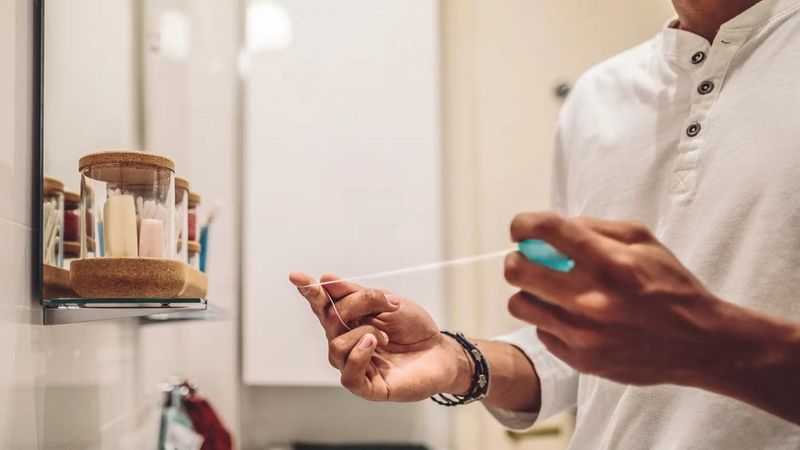
Food particles trapped between teeth become bacteria playgrounds, leading to that tell-tale stink. Thorough brushing twice daily removes these particles before they cause trouble.
Don’t rush the process – dentists recommend a full two minutes of brushing. Pay special attention to your back teeth where food loves to hide. And don’t forget about flossing! It reaches places your toothbrush simply can’t.
Pro tip: Set a timer while brushing to ensure you’re giving those pearly whites the time they deserve. Your breath (and everyone around you) will thank you for these extra minutes of care.
2. Tackle That Tongue Coating
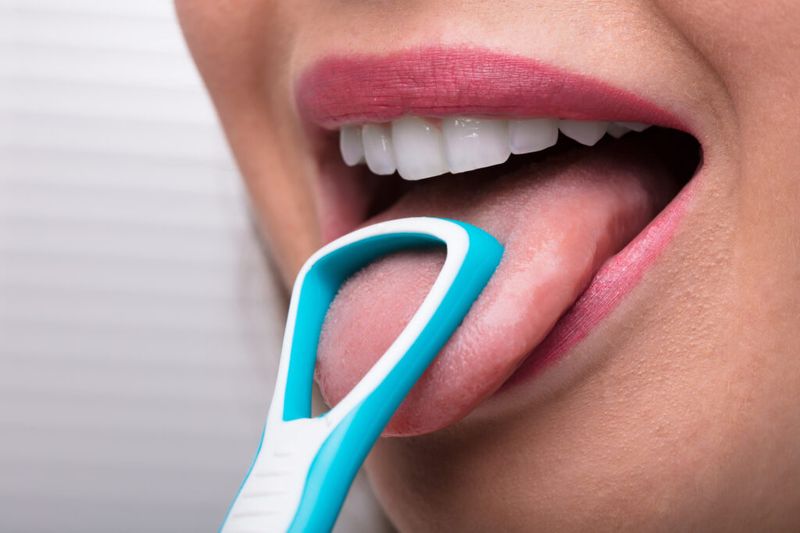
Your tongue is basically a bacteria magnet. That white or yellowish coating? It’s a mixture of bacteria, dead cells, and food debris – all major culprits behind bad breath. Cleaning your tongue should be part of your daily routine.
You can use a tongue scraper (available at most drugstores) or the bristles on your toothbrush. Start at the back and gently work forward, rinsing between scrapes. The difference will be immediately noticeable!
Many people skip this step, but it might be the most important one for fresh breath. Some studies suggest that tongue cleaning alone can reduce bad breath by up to 70%.
3. Rinse Away Bacteria With Mouthwash
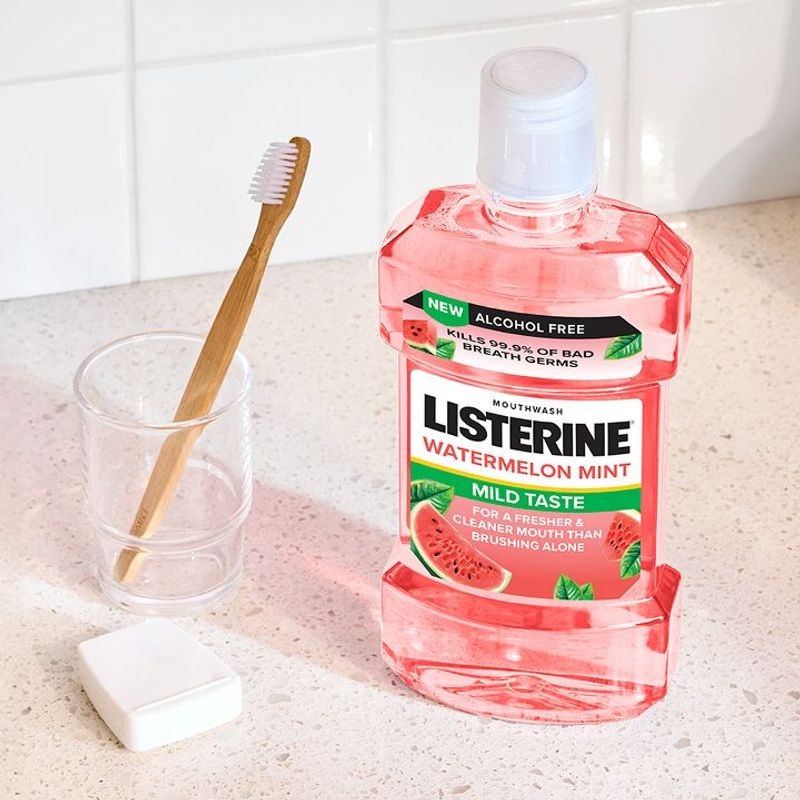
Antibacterial mouthwash targets the tiny troublemakers responsible for odor. Unlike regular mouthwash that just masks smells temporarily, antibacterial formulas actually reduce bacteria populations in your mouth.
Look for ingredients like cetylpyridinium chloride (CPC) or chlorhexidine, which are proven bacteria fighters. Swish for a full 30 seconds to get the maximum benefit – count it out if you need to!
Alcohol-free options work well for sensitive mouths while still fighting bacteria. Remember though, mouthwash works best as part of a complete routine, not as a substitute for brushing and flossing.
4. Hydration: Your Breath’s Best Friend

Dry mouth is a breeding ground for smelly bacteria. When you’re dehydrated, your body produces less saliva – nature’s built-in mouth cleanser that washes away food particles and neutralizes acids.
Aim for at least eight glasses of water daily. Carry a reusable water bottle as a reminder to sip throughout the day. Morning breath happens partly because saliva production decreases while you sleep.
A quick morning water chug can jump-start saliva flow before you even brush. Water also helps flush toxins from your body and keeps your digestive system running smoothly – both factors that contribute to fresher breath from the inside out.
5. Pop in Sugar-Free Gum After Meals

Chewing gum stimulates saliva production – your mouth’s natural cleaning system. But not just any gum will do! Sugar-free varieties, especially those containing xylitol, are your best bet.
Xylitol doesn’t just freshen breath temporarily; it actually helps prevent bacteria from sticking to teeth. The physical act of chewing also dislodges food particles that might be hanging around after meals.
Keep a pack handy for those times when brushing isn’t possible, like after lunch at work. Just five minutes of chewing can make a significant difference in breath freshness when you’re on the go.
6. Crunch Your Way to Cleaner Breath

Apples, celery, and carrots are like nature’s toothbrushes. Their firm, crunchy texture scrubs away plaque and food particles as you chew. The high water content in these foods also helps rinse your mouth.
Raw vegetables and fruits increase saliva production too, which naturally cleanses your mouth. They’re particularly helpful when eaten at the end of a meal – think of them as a natural dessert that cleans as it goes.
Bonus: the fiber in these foods aids digestion, preventing stomach issues that can contribute to bad breath. Try keeping cut veggies in your fridge for a quick breath-freshening snack that’s good for your whole body.
7. Fresh Herbs: Nature’s Breath Mints
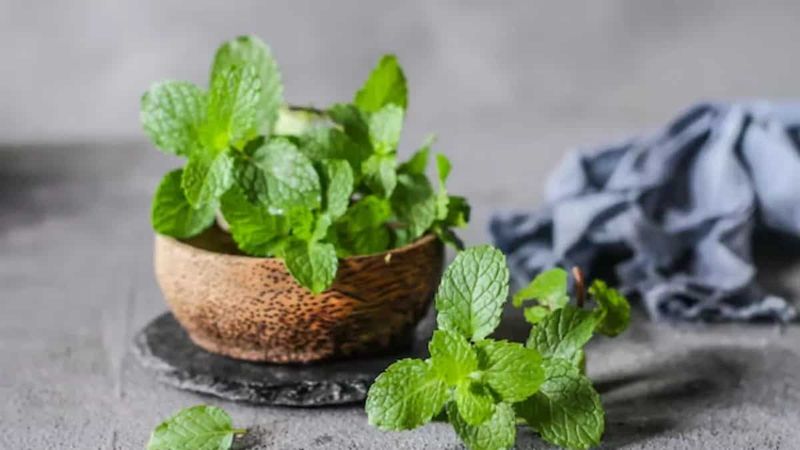
Parsley isn’t just a pretty garnish – it contains chlorophyll, a powerful natural deodorizer. Ancient Romans chewed parsley sprigs after meals, and this old-school remedy still works today!
Mint leaves deliver that familiar freshness we associate with clean breath, while basil contains antibacterial properties. Keep a small herb garden in your kitchen for easy access to these natural breath fresheners.
For maximum benefit, chew the herbs thoroughly to release their essential oils before swallowing. You can also muddle fresh herbs in water for a refreshing drink that doubles as breath protection throughout the day.
8. Baking Soda Rinse: The Pantry Solution
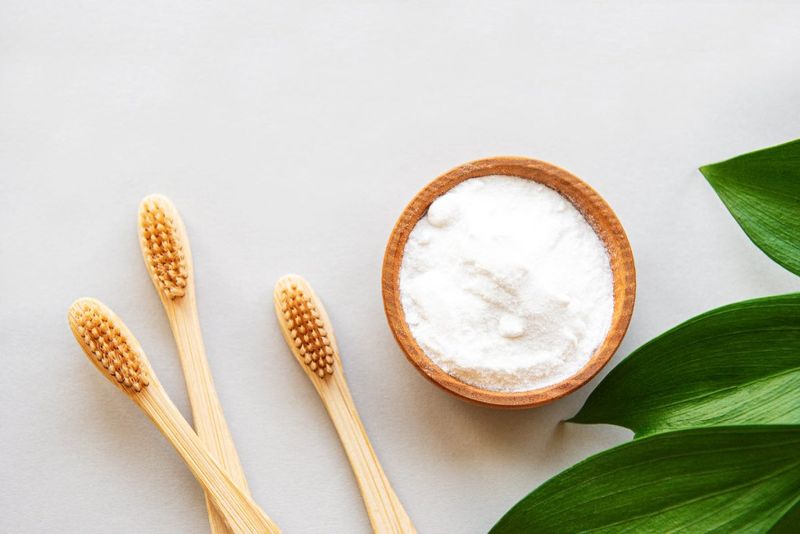
Baking soda neutralizes acids in your mouth that cause bad breath. It’s like a reset button for your mouth’s pH balance! Creating a simple rinse takes seconds – just mix half a teaspoon of baking soda in a glass of warm water.
Swish thoroughly for about 30 seconds, making sure to reach all areas of your mouth. This solution works differently than commercial mouthwashes by actually changing the environment that odor-causing bacteria prefer.
Many people notice immediate results with this natural remedy. As an added benefit, baking soda is gentle enough for daily use and costs pennies compared to specialty breath products.
9. Yogurt and Tea: Unexpected Breath Saviors

Plain yogurt contains beneficial bacteria that can crowd out the smelly kinds. Studies show eating unsweetened yogurt regularly reduces hydrogen sulfide – the same compound that makes rotten eggs smell terrible.
Green and black teas contain polyphenols that suppress bacterial growth and sulfur compounds. A cup after meals offers double protection: the liquid helps wash away food particles while the polyphenols fight odor at its source.
For yogurt, choose varieties with active cultures and no added sugar. With tea, brewing it slightly stronger than usual maximizes the breath-freshening compounds. Both options make for healthy daily habits with benefits beyond just fresher breath.
10. Dodge the Breath-Wrecking Culprits

Garlic and onions contain sulfur compounds that enter your bloodstream and travel to your lungs, where you breathe them out. No amount of brushing can completely eliminate this type – it has to work its way through your system.
Alcohol dries out your mouth, reducing saliva flow and creating the perfect environment for odor-causing bacteria. Smoking not only causes its own distinct mouth odor but also increases your risk of gum disease.
When you can’t avoid these triggers completely, timing matters. Save the garlic bread for nights when you’re not meeting new people! And always hydrate extra well when consuming alcohol to minimize its drying effects.
11. Keep Your Toothbrush Fresh and Effective
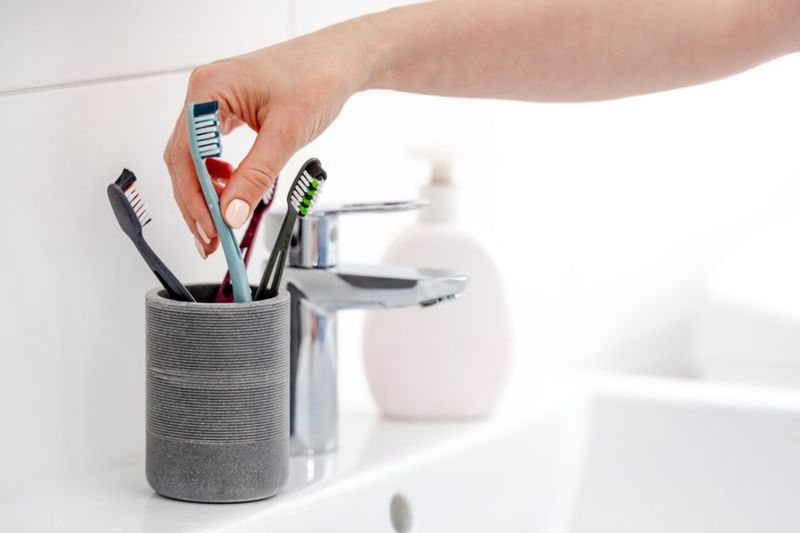
Your toothbrush collects bacteria over time, becoming less effective and potentially reintroducing germs to your mouth. Bristles also wear down, reducing their cleaning power significantly after a few months of use.
Mark your calendar or set a phone reminder for replacements every 3-4 months. Many electric toothbrushes now come with apps that track usage and alert you when it’s time for a new brush head.
Between replacements, rinse thoroughly after each use and store your brush upright where it can air dry completely. Avoid brush covers that can trap moisture and create a breeding ground for bacteria – your brush needs to breathe!
12. Schedule Regular Dental Checkups

Dentists can spot issues you might miss – like early gum disease or hidden cavities that contribute to bad breath. Professional cleanings remove hardened plaque (tartar) that home brushing can’t touch.
Aim for visits every six months, or more frequently if recommended by your dentist. Beyond cleaning, these appointments provide opportunities to discuss any breath concerns directly with a professional who can identify underlying causes.
Dental professionals can also recommend personalized products for your specific situation. Many people notice significantly fresher breath immediately following professional cleanings, proving just how effective these visits can be!
13. Address Health Issues Behind the Odor

Sometimes bad breath persists despite perfect oral hygiene because it’s coming from elsewhere in your body. Sinus infections, acid reflux, diabetes, and liver or kidney problems can all cause distinctive breath odors.
Pay attention to patterns – does your breath worsen at certain times or with specific symptoms? Keep track and discuss with your doctor. Persistent bad breath deserves medical attention, especially when accompanied by other symptoms.
Treating the underlying condition often resolves breath issues automatically. This approach tackles the root cause rather than just masking symptoms, leading to better overall health and naturally fresher breath as a welcome side effect.

Comments
Loading…